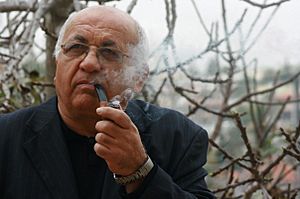Salman Natour facts for kids
Salman Natour (born July 3, 1949 – died February 15, 2016) was a talented writer and novelist. He was a Druze-Palestinian person and also a citizen of Israel. Natour wrote many books and plays in both Hebrew and Arabic. He was especially known for his work called Granta.
He was born in Daliyat al-Karmel south of Haifa in 1949. He finished high school right there in his hometown. After that, he went to university. He studied first in Jerusalem and then later in Haifa. He passed away on February 15, 2016, after a serious heart attack.
Contents
Who Was Salman Natour?
Salman Natour was an important figure in the world of writing. He was known for his ability to write in two different languages, Arabic and Hebrew. This made his work special and allowed him to reach many readers. He wrote novels, which are long stories, and plays, which are stories meant to be acted out on a stage.
Early Life and Education
Salman Natour's journey began in a town called Daliyat al-Karmel. This town is located in the southern part of Haifa.
Growing Up in Daliyat al-Karmel
He was born in 1949. Like many kids, he went to school in his hometown. He completed his high school studies there. This early education helped him prepare for his future as a writer.
Studying at University
After high school, Salman Natour continued his education at university. He first studied in the historic city of Jerusalem. Later, he moved to Haifa to continue his studies. Learning at these universities helped him develop his skills and knowledge.
His Writings and Plays
Salman Natour was a very active writer. He created many different kinds of works. His writing often explored themes important to his background and community.
What He Wrote About
He wrote many books and plays. His most famous work was called Granta. Through his stories and plays, he shared his ideas and observations with the world. Writing in both Arabic and Hebrew allowed his stories to be read by a wider audience.
His Legacy
Salman Natour passed away on February 15, 2016. He left behind a collection of works that continue to be read and appreciated. His contributions to literature are remembered by many.
 | James Van Der Zee |
 | Alma Thomas |
 | Ellis Wilson |
 | Margaret Taylor-Burroughs |


